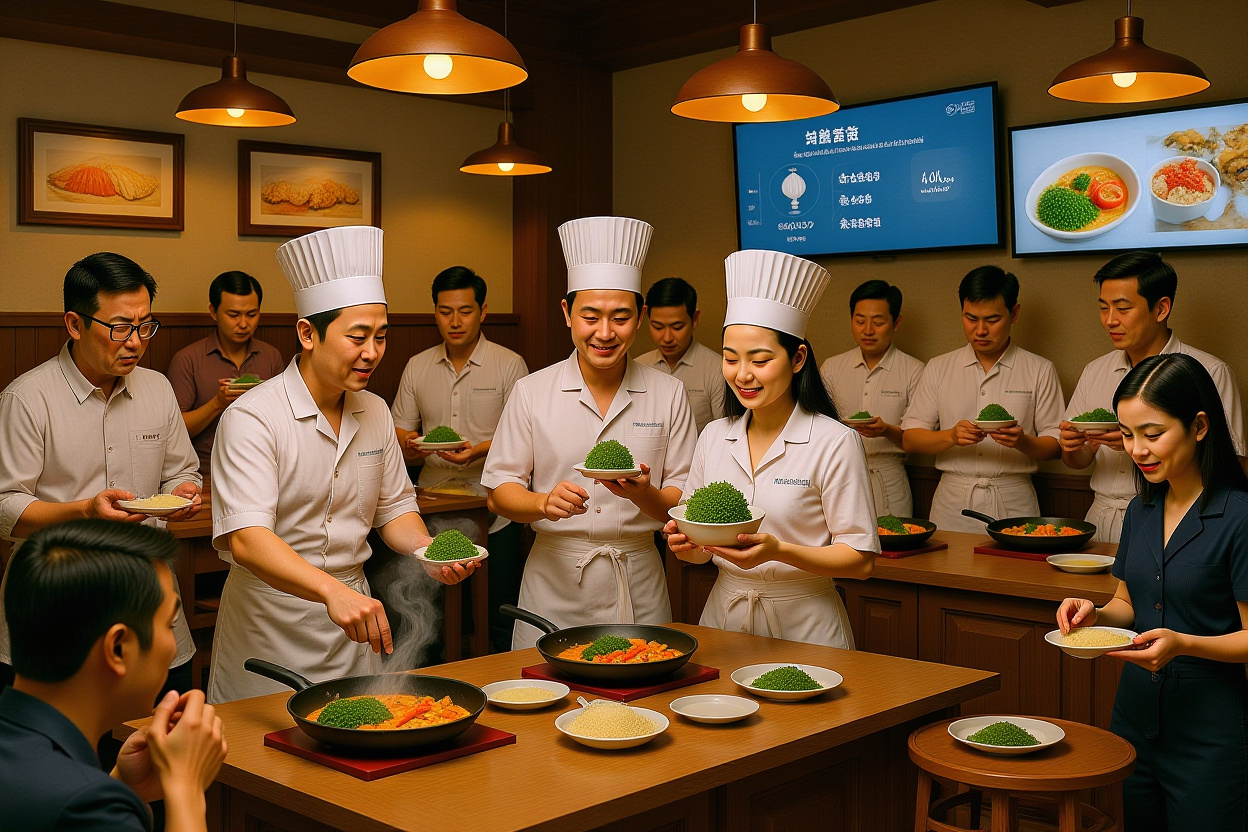Market Impact of Prepared Food Controversy
China’s premium casual dining sector faced unprecedented scrutiny last week as Xi Bei莜面村 (Xi Bei You Mian Cun) became the epicenter of the nationwide prepared food debate. The controversy erupted when prominent technology entrepreneur Luo Yonghao (罗永浩) publicly criticized the chain’s reliance on prepared ingredients, triggering immediate consumer backlash and operational impacts across its nearly 400 locations nationwide.
The prepared food controversy has exposed fundamental questions about transparency in China’s food service industry. As one of China’s most visible restaurant chains, Xi Bei’s response to these allegations will likely set precedents for how the industry addresses growing consumer demand for culinary authenticity. Founder Jia Guolong (贾国龙) acknowledged significant financial impact, with daily revenue declining by approximately ¥2-3 million during the controversy’s peak.
Weekend Traffic Analysis
Our investigation at Xi Bei’s Liuliqiao flagship store revealed dramatic weekend traffic patterns shift. Compared to the previous Saturday’s 140-table waiting list, September 13th saw only 37 tables waiting during peak lunch hours representing a 73.6% decrease in customer demand. Evening operations showed even more pronounced effects with under 50% occupancy observed at 6:15 PM despite the store’s normal evening capacity.
Operational Response and Kitchen Transparency
In response to mounting criticism, Xi Bei implemented unprecedented transparency measures by opening kitchen access to journalists and customers. This move revealed several operational practices that have become focal points in the prepared food controversy. The chain’s kitchen operations demonstrate a hybrid approach combining fresh preparation with strategically deployed pre-processed ingredients.
Frozen Vegetable Disclosure
The most controversial discovery involved frozen organic broccoli with a 24-month shelf life. Chef Liu Long (刘龙) explained the operational necessity: “Organic vegetables typically have more pest issues. Our unified purchasing and quick-freezing approach ensures both food safety and dish consistency.” The frozen broccoli originates from Shandong province through supplier Taian Taishan Asia Food Company Limited (泰安泰山亚细亚食品有限公司).
Price analysis reveals interesting supply chain dynamics. At ¥8.9 per jin (approximately 500 grams), Xi Bei’s frozen broccoli costs significantly less than retail fresh organic broccoli selling at ¥18 per jin on platforms like Hema (盒马). This cost differential partially explains the economic rationale behind the frozen ingredient strategy.
Financial Implications and Market Response
The prepared food controversy has translated into immediate financial consequences for Xi Bei operations. Founder Jia Guolong’s disclosure of ¥100-300 million in daily revenue reduction highlights the vulnerability of even established restaurant brands to social media-driven consumer movements. This case demonstrates how quickly market sentiment can affect operational performance in China’s competitive dining sector.
Revenue Impact Assessment
The reported revenue decline represents approximately 5-15% of typical daily turnover based on industry estimates of Xi Bei’s total revenue. This sudden drop particularly affects the chain’s premium positioning, as customers paying premium prices demonstrate lower tolerance for prepared ingredients than fast-food consumers. The controversy’s timing during weekend peak periods magnified the financial impact.
Consumer Perspectives and Industry Implications
The prepared food controversy has ignited broader discussions about culinary authenticity and transparency in China’s food service industry. Customer responses observed during our investigation revealed nuanced perspectives on food preparation practices.
Diner Feedback Analysis
Regular customer Mr. Zhang expressed measured views: “We should objectively understand and specifically analyze prepared food. If done properly, its quality can match fresh preparation. Some dishes actually require advance processing.” This perspective reflects growing consumer sophistication regarding modern kitchen operations while maintaining expectations for transparency.
Many industry observers believe this controversy will accelerate regulatory development. As Luo Yonghao noted in his concluding remarks, the incident highlights the urgent need for “prepared food-related national regulations to be introduced as soon as possible.” This sentiment echoes throughout the industry as stakeholders seek clearer guidelines for ingredient disclosure and preparation standards.
Strategic Outlook and Industry Evolution
The prepared food controversy represents a pivotal moment for China’s restaurant industry. Xi Bei’s experience demonstrates how quickly operational practices can become public controversies in the age of social media amplification. The chain’s response including kitchen transparency and executive engagement provides a case study in crisis management for the food service sector.
Supply Chain Considerations
The revelation about frozen vegetable usage highlights complex supply chain decisions restaurants face between quality consistency, food safety, and consumer perceptions. Xi Bei’s explanation about organic vegetable pest challenges illustrates legitimate operational considerations that consumers rarely consider when evaluating food preparation practices.
Industry-wide, this controversy will likely accelerate moves toward greater transparency. Restaurants may increasingly adopt visible kitchen designs, ingredient sourcing disclosures, and clearer preparation descriptions. These changes respond to growing consumer interest in culinary authenticity and food provenance.
Path Forward for Chinese Dining Sector
The prepared food controversy at Xi Bei reflects broader evolution in China’s consumer expectations regarding food transparency. As the market matures, successful restaurants will need to balance operational efficiency with authentic culinary experiences. This case demonstrates that even established brands must continuously adapt to changing consumer preferences.
Regulatory development will play a crucial role in establishing clear industry standards. The current ambiguity around prepared food definitions creates challenges for both restaurants and consumers. Clear guidelines from agencies like the State Administration for Market Regulation (国家市场监督管理总局) would help establish consistent standards across the industry.
For investors and industry participants, this controversy highlights the importance of brand management in the dining sector. Consumer perceptions can change rapidly, requiring agile response strategies. Companies that proactively address transparency concerns may gain competitive advantages as the market evolves toward greater openness about food preparation practices.
Monitor regulatory developments through official channels and consider how transparency initiatives might affect restaurant sector valuations. The evolving conversation around food preparation standards will likely create both challenges and opportunities across China’s dining industry in coming quarters.




